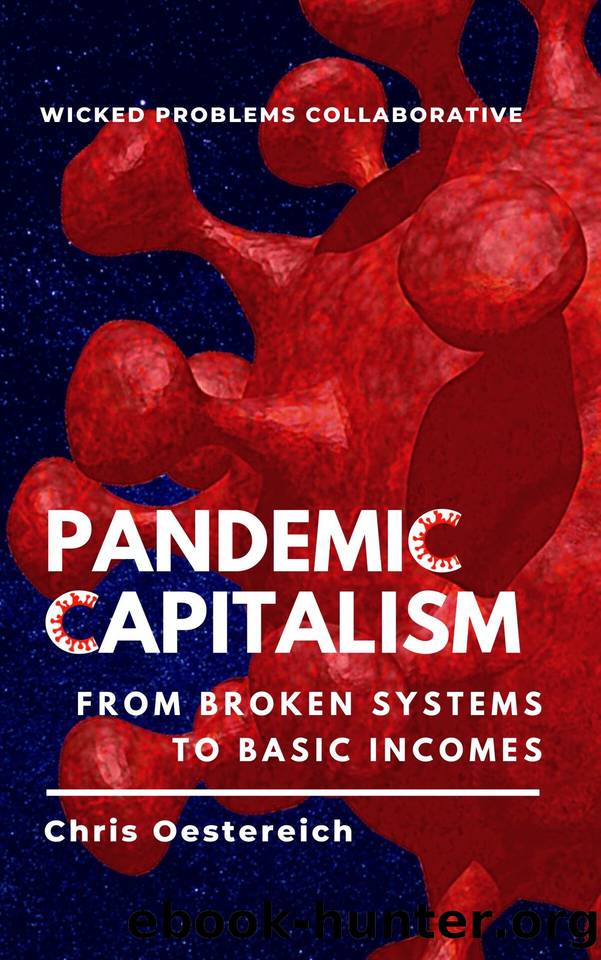Pandemic Capitalism: From Broken Systems To Basic Incomes by Oestereich Chris

Author:Oestereich, Chris [Oestereich, Chris]
Language: eng
Format: epub
Publisher: Wicked Problems Collaborative
Published: 2020-07-03T16:00:00+00:00
8
The Road Not Yet Taken
Our ability to solve a problem is limited by our conception of what is feasible. 58
—Russell Ackoff
A merica has problems. Record numbers of people are out of work. Many of the jobs that still exist haven’t been delivering on their promise for a long time. The safety net is in tatters.
The meat sector is a microcosm of our ongoing challenges—and the heightening effects of the pandemic. In March, some meatpackers warned they would continue working if they contracted the coronavirus for fear of losing their jobs or coming up short on their financial obligations. (Major firms in the industry did not offer sick leave benefits.) By May 11, over twenty meatpacking plants had closed (including half the nation’s pork processing capacity), and more than 12,500 of the industry’s workers had contracted the coronavirus. (The industry’s high level of concentration was good for profitability, but at what cost?) 59
Whether any meatpackers knowingly went to work while infected, their threats laid bare the broken nature of our system. Why would workers threaten their colleagues with a deadly disease unless they felt compelled to do so?
The system which forces us to satisfy our needs individually hinders our ability to respond collectively. Think about climate change. The more we produce, the bigger the problem becomes. And then think about how much of the work that’s performed is not beneficial (or even detrimental) in terms of satisfying human needs? It’s worth considering whether we even need everyone to work. I’m sure many would argue that such a notion isn’t true in general, but the coronavirus outbreak confirmed that, at least sometimes, we are all better off if a lot of people don’t go to work. Let’s dig in on the ‘general’ argument.
Our current system is based on the idea of jobs with 40-hour workweeks. The social contract it represented worked for a long time for many people, but it has become a broken promise for far too many of us. We’re now stuck in a system that isn’t designed to adapt to the amount of work that’s needed in sum, nor the amount that’s allotted to individual workers, at a time when we need to drastically change both of those factors. In other words, if we all need to do our part, then maybe our parts all need to become smaller.
We are so used to relying on work for our economic security that the idea of not having to do so seems outlandish. Instead, we’re accustomed to a system in which we play an increasingly frantic loser-take-none game of musical chairs. (There were over a half a million homeless people in the US in 2019. What will it be like when the pandemic’s dust settles?) 60
But it doesn’t have to be that way. If we reframe our thinking about the economy to abandon competition for our primary needs, the solution becomes clear: a universal basic income.
Let’s imagine a monthly payment that provided a moderate income floor, but didn’t count against means-testing thresholds or otherwise remove the support provided by existing safety net programs.
Download
This site does not store any files on its server. We only index and link to content provided by other sites. Please contact the content providers to delete copyright contents if any and email us, we'll remove relevant links or contents immediately.
International Integration of the Brazilian Economy by Elias C. Grivoyannis(100966)
The Radium Girls by Kate Moore(11987)
Turbulence by E. J. Noyes(7993)
Nudge - Improving Decisions about Health, Wealth, and Happiness by Thaler Sunstein(7669)
The Black Swan by Nassim Nicholas Taleb(7069)
Rich Dad Poor Dad by Robert T. Kiyosaki(6539)
Pioneering Portfolio Management by David F. Swensen(6264)
Man-made Catastrophes and Risk Information Concealment by Dmitry Chernov & Didier Sornette(5962)
Zero to One by Peter Thiel(5743)
Secrecy World by Jake Bernstein(4710)
Millionaire: The Philanderer, Gambler, and Duelist Who Invented Modern Finance by Janet Gleeson(4432)
The Age of Surveillance Capitalism by Shoshana Zuboff(4258)
Skin in the Game by Nassim Nicholas Taleb(4211)
Bullshit Jobs by David Graeber(4150)
The Money Culture by Michael Lewis(4147)
Skin in the Game: Hidden Asymmetries in Daily Life by Nassim Nicholas Taleb(3966)
The Dhandho Investor by Mohnish Pabrai(3731)
The Wisdom of Finance by Mihir Desai(3703)
Blockchain Basics by Daniel Drescher(3546)
